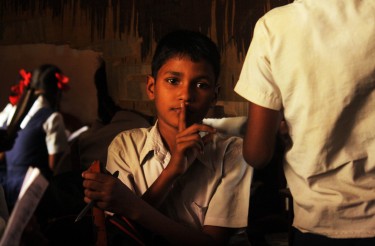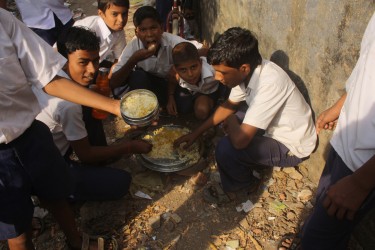Twenty-two children [1] between four and 12 years old [2] at a public primary school in the Indian state of Bihar [3] are dead after eating contaminated mid-day meals on July 16, 2013.
Many more in the poor, rural village of Chapra were hospitalized in serious condition. The food is believed to have been poisoned by pesticides.
The tragedy was the worst incident in a rash of apparently tainted school lunches. In a separate incident in Bihar's Madhubani district, 15 students [4] fell ill after eating mid-day meals. In Gaya-Bihar [5], one student was killed after eating school lunch there. And in another separate incident in Dhule [6] in the district of Maharashtra, 31 children were hospitalized after having their mid-day meals.

A student at a government-funded Hindi school in outskirts of Mumbai, India, 2011. Photo by author.
The mid-day meal scheme [7], which began in the 1960's, is one of India's oldest and aims to encourage marginalized classes to send their children to schools. Besides the education, a meal for every student is given as an incentive for enrollment. However, ever since the start of the scheme, reports of embezzlement of food meant for children have consistently surfaced. A 2006 news report found that students of a primary school in Darjeeling were deprived of their meals for 18 months [8].
The issue has, as expected, taken a political twist. The political party in power has alleged that the opposition has indulged in a conspiracy to frame them. The school principal's husband is reported [9] to be a political figure who was responsible for supplying food to the school.
The negligence on the part of the government angered many on social networking sites.
India-based Twitter user Vikram Singh (@cynicalvs [10]) wrote:
@cynicalvs: [11] How can kids die of eating a midday meal? It is food. Somebody needs to be tried for murder. #chappra [12]
As soon as journalists began reaching hospitals to report on the situation, more mismanagement came to surface. The streamed video images showed surviving children laid next to each other crammed [13] on a desk and saline water being administered.
Milind Khandekar, the managing editor of ABP News (@milindkhandekar [14]), observed:
@milindkhandekar: [15] Pictures from Chappra shows relatives using paper fan for children admitted in the hospital. Is this ‘ Bihar model of development?
This incident, soon enough, prompted users on social media to discuss negligence and arrogance of Indian politicians.
Abhijit Majumder, a journalist from Delhi (@abhijitmajumder [16]), tweeted:
@abhijitmajumder: [17] Our politicians don't discriminate. 2G for the better-off or NREGA, Mid-day meal for the poorest, all are robbed with equal relish. #Chhapra [18]

Students of a Hindi school in the outskirts of Mumbai eat on the ground with no seating or plates. Another student shows a tiffin box and complains about the quality of the food. 2011. Photo by author.
Majumder, was making a reference to recent scams such as 2G [19] and NREGA [20], which have run into billions of dollars and planted grave mistrust towards the way Indian government functions.
Another Delhi-based journalist, Raghavendra Verma (@r_verma [21]), made a commentary on the general attitude of the teachers at these government run schools:
@r_verma: [22] School teachers serve mid day meal to children as if they are doing some big personal favour to them. #Chhapra [18]
Fazal Abbas (@fazlabas [23]), a Mumbai-based Twitter user, brought some historical perspective to the ongoing discourse:
@fazlabas: [24] Chhapra is same as our first president Dr. Rajendra Prasad left half century back. Children are dying for education.
Kiran Bedi (@thekiranbedi [25]), a former police officer from Delhi who is recognized for her philanthropic activities and anti-corruption crusade in India, tweeted:
@thekiranbedi: [26] Mid-day meals, at places r a scandal and un-hygienic. Teachers too r wasting time cooking!Why not serve fruits and nuts?
Bedi's narrative corroborates with the above photographic evidence. Not just Bihar, government run schools, across India, may have bigger stories [27] of negligence and mismanagement to tell. As far as this case is concerned, the Indian government was quick to announce a compensation of 2 lakhs [28] (about 3,367 US dollars) to the victims family.
The exact cause of how the food became contaminated is being studied – in short, a long bureaucratic process follows. Will those guilty be held accountable?